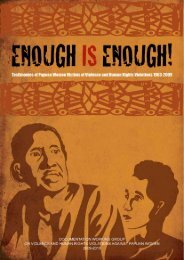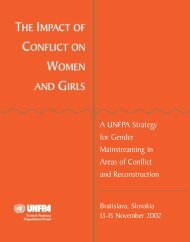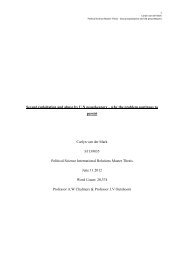Download the full report - Human Rights Watch
Download the full report - Human Rights Watch
Download the full report - Human Rights Watch
You also want an ePaper? Increase the reach of your titles
YUMPU automatically turns print PDFs into web optimized ePapers that Google loves.
Methodology<br />
From November 2011 to October 2012, <strong>Human</strong> <strong>Rights</strong> <strong>Watch</strong> conducted extensive<br />
interviews in Sri Lanka, Australia, <strong>the</strong> United Kingdom, Germany, India, Malaysia, and<br />
Indonesia with victims of alleged sexual violence by <strong>the</strong> Sri Lankan security forces. In total,<br />
we interviewed 120 people, including 68 victims, 10 relatives of victims, 11 witnesses to<br />
sexual violence, and 31 church and nongovernmental organization workers, international<br />
agency staff, doctors, and lawyers. We also obtained, with <strong>the</strong> victims’ permission,<br />
detailed medical and psychiatric records in 60 of <strong>the</strong>se cases, which include hospital and<br />
general practitioner records and medico-legal records (MLRs), which are medical<br />
assessments, submitted to an immigration authority in support of a torture survivor’s<br />
asylum claim. In three cases, <strong>the</strong> victim’s account of rape was found credible by<br />
immigration courts in <strong>the</strong> UK and no medical assessment was conducted.<br />
Research into sexual violence requires taking into account <strong>the</strong> consequences for victims of<br />
speaking about what <strong>the</strong>y experienced, including possible threats to <strong>the</strong>ir physical<br />
security and <strong>the</strong>ir position within <strong>the</strong> community should what <strong>the</strong>y say become publicly<br />
known. Speaking about sexual violence can also impact <strong>the</strong> victim’s emotional and<br />
psychiatric health.<br />
<strong>Human</strong> <strong>Rights</strong> <strong>Watch</strong> took great care to ensure that victims of sexual violence were<br />
interviewed in safe conditions and were comfortable speaking about <strong>the</strong>ir experiences.<br />
The interviews took place privately in <strong>the</strong> presence of a trusted interpreter and, in some<br />
cases, o<strong>the</strong>r family members. In all, we interviewed 68 people—27 men, 38 women, and 3<br />
boys— who alleged <strong>the</strong>y suffered rape and o<strong>the</strong>r sexual violence by members of Sri Lankan<br />
security forces between 2006 and 2012. We also interviewed individuals who said <strong>the</strong>y<br />
were present with victims immediately after <strong>the</strong> latter were raped in 2009. Most victims<br />
specifically told us <strong>the</strong>y were concerned about possible reprisals by Sri Lankan security<br />
forces against <strong>the</strong>m should <strong>the</strong>ir identities become known. The names of all victims<br />
interviewed for this <strong>report</strong> have been withheld, replaced with names and initials that do<br />
not reflect <strong>the</strong>ir real names to protect <strong>the</strong>ir security. <strong>Human</strong> <strong>Rights</strong> <strong>Watch</strong> has also withheld<br />
victims’ place of residence, as well as specific dates, locations, and o<strong>the</strong>r information that<br />
could potentially be used to identify <strong>the</strong>m. All are ethnic Tamil unless o<strong>the</strong>rwise specified.<br />
Ages are <strong>the</strong> age at time of arrest. The month and year of detention and release, ra<strong>the</strong>r<br />
“WE WILL TEACH YOU A LESSON” 10




![IANSA [PDF, 2MB] - PeaceWomen](https://img.yumpu.com/25206379/1/190x123/iansa-pdf-2mb-peacewomen.jpg?quality=85)
![Commitments Sample [PDF, 93KB] - PeaceWomen](https://img.yumpu.com/25206331/1/190x245/commitments-sample-pdf-93kb-peacewomen.jpg?quality=85)










![A Toolkit for Advocacy and Action [PDF, 260KB] - Peace Women](https://img.yumpu.com/25205989/1/190x245/a-toolkit-for-advocacy-and-action-pdf-260kb-peace-women.jpg?quality=85)